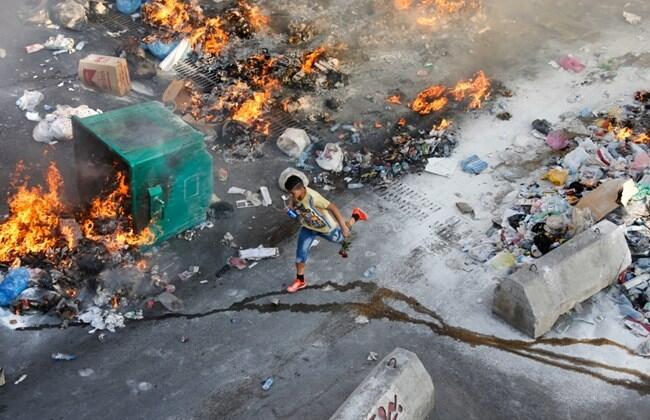Several Mount Lebanon municipalities opened makeshift dumps, initiated ad hoc collection services, and prepared to sell their waste to recycling. But the outlook for Beirut was bleak and short on solutions. Overturned dumpsters and their smoldering contents blocked off Beshara al-Khoury, a major artery that runs through the capital, early in the evening, and sprawling mounds of trash forced pedestrians onto roadways throughout the region. Many piles were aflame, multiplying the public health risks. Beirutis overlooked warnings by the Beirut Fire Department that burning trash pumps far more pollution into the atmosphere than trash itself and emits gases and toxic compounds that adversely affect the health of residents. Sukleen, the region’s waste management contractor, stopped collecting garbage Sunday after the government closed its primary landfill in Naameh without identifying new disposal grounds. The fill had accumulated over 15 million tons of garbage over 17 years, far above its intended capacity of just 2 million. The Kataeb Party hosted a summit between Environment MinisterMohammad Machnouk and various municipality unions in the hopes of having them find dumps to gather their uncollected garbage. At a news conference afterward, Machnouk emphasized that the dumps would be temporary until new companies are contracted to create sanitary landfills. “We will be placing waste in these locations only until a solution is found for them,” Machnouk said. “We hope that there will be full cooperation when the locations of the chosen dump sites are announced.”But capital officials seemed especially at a loss regarding solutions. There was no news Friday of a contract Beirut Mayor Bilal Hamad had prepared in order to send the city’s trash to a private dump belonging to the Al-Amana al-Arabia Company, in Srar, Akkar. Beirut MP Mohammad Qabbani told The Daily Star Friday that the contract had been signed, but said the parties still had to overcome the objections of officials in the north. “Until now, the MPs and the municipalities don’t accept it. It’s not enough to sign with the owner of a certain parcel of land. We are trying to solve [the deadlock] by promising to support Akkar’s right to development,” Qabbani said, adding that former prime ministers Saad Hariri and Fouad Siniora, both of the Future Movement, were lending their weight to negotiations. All Akkar MPs belong to the movement. The space is 2 million square meters in size, according to Qabbani – about six times the area of the Naameh landfill. “The project in its current shape is rejected by us and all the people of Akkar,” Akkar MP Khaled Zahraman said. “There’s no plan to treat Lebanon’s garbage. When there is a clear plan, then perhaps we can help out. We want to know how much we will treat. Every area must share Beirut’s burden. But for all the waste to go to Akkar – no.” “Akkar is deprived. Unfortunately, the state remembers us for waste, but not for development,” he added. Meanwhile, Hamad told The Daily Star Friday that he could not organize ad hoc garbage collection as neighboring municipalities have done. “We do not have any large areas in Beirut, which is only 20 square kilometers. We are in a residential city with a high population density. Where would I dump the waste, under the bridge?” Just outside Beirut, workers for the municipality of Furn al-Shubbak dug a pit under an overpass and began dumping the city’s trash. “We dug a place because the situation is unbearable on the streets,” said Raymond Samaan, the municipality’s president. “The state and Sukleen dumped this on us. We hired day laborers to collect trash. We rented trucks and diggers. It’s all to relieve the people for two weeks, because that’s all the space we have.” In Baskinta, the municipality assigned all its employees to garbage collection. The village is “storing” its trash at the site of an old landfill closed 20 years ago, Mayor Tanous Ghanem told The Daily Star, until it could be removed to a permanent fill. “We don’t have trash on our streets,” he said. Environmentalists have been urging municipalities to sell trash to recycling to cut down on volume, and Friday it appeared that some officials were listening. “We’re actively searching for recycling partners,” Ghanem said. “We’re planning to bring some sorting and civilization while the state seems busy with other things.” The Union of Municipalities of Al-Gharb al-Ala and Chehhar is distributing colored bags so residents can sort their trash at home. The union is negotiating with a recycling company to sell paper waste at up to $70 per ton, according to president Walid al-Aridi. The Municipality of Roumieh urged its residents to begin sorting their recyclables midweek. Several recycling companies contacted by The Daily Star said they would welcome the extra volume, if the country in fact shifts toward recycling. The crisis kindled popular discontent with the government, and some politicians were quick to follow the current. “Revolt against your leaderships and turn the table before the nation is overturned,” Labor Minister Sejaan Azzi told Lebanese citizens in comments published Friday. He is a member of the Kataeb Party. Activists are preparing for a demonstration outside the Grand Serail in Downtown Beirut Saturday to denounce government mismanagement. The event page on Facebook encourages protesters to bring their garbage and dump it at the Serail. Sukleen’s workers continued to sweep and gather trash into giant mounds, and coat them in a white powder that cuts down on the stench. Pascale Nassar, the company’s Communications Director, said it was calcium carbonate, a nonreactive and nontoxic relative of lime. Sukleen’s contract expired on July 17, but the company agreed to continue to provide its services for the interim. The Council for Development and Reconstruction issued tenders to manage Greater Beirut’s waste Tuesday, Machnouk said Thursday. He said the outcome would materialize within 15 days. Philip Issa| The Daily Star











